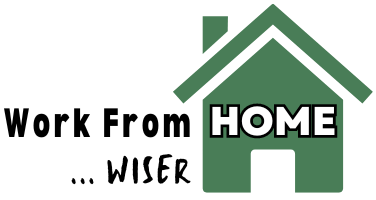The name of this site, Work From Home Wiser, glosses over an important truth about working from home – there are many different ways to do it.
I work from home full-time as a freelance writer and entrepreneur. I am self-employed.
On the other hand, my partner, who also works from home, is an employee. He works remotely for a company.
As my own boss, I am not responsible to anyone but clients and customers. My work is largely self-directed, and I have almost absolute control of how I manage and allocate my working time.
My partner too has considerable control over when he does his work, but his control is not as absolute as mine. Though he does not work from a conventional office, he operates within a corporate structure. He is sometimes required to attend meetings (even if only by phone or Zoom call). He must also perform his work according to certain corporate guidelines and must achieve specified performance metrics.
I work alone. I am not expected to interact with anyone but my clients and customers. These interactions are infrequent, and I largely control when they happen.
My partner too has customers. But he also has coworkers – bosses, colleagues, and people he supervises. He doesn’t get through a workday without interacting with all of them. A lot!
I work best in the morning. I generally sit down to work around 7:00 am and work until 1:00 in the afternoon. Then I take a break and come back and do a little more work in the evening. I tend to work seven days a week.
My partner works Sunday through Thursday, mostly at night. He’ll be indignant if I don’t say that he works on and off throughout the day too – which he does. (He typically also tries to squeeze in a nap.) But he’s really “on the clock” beginning around 4:00 pm when he is responsible for supervising the work of his employees. This work can go on until well past midnight. (Thus the naps.)
Part of my work is securing work so that I can generate income on an ongoing basis.
My partner gets a paycheck with bonuses and raises.
Our work lives really couldn’t be more different. And yet, technically, we both work from home.
The different ways we work from home - commonly used terms.
• Working from home
• Working remotely
• Teleworking
• Employee
• Independent contractor
• Freelancer
• Gig worker
• Temporary worker
• Self-employed
• Entrepreneur
• Hybrid work
• Flex time
• Coworking
• Digital nomad
Commonly Used Terms
With just myself and my partner as examples, it’s easy to see that working from home is not one-size-fits-all. And so, naturally, there are a variety of terms used to describe the different ways we go about it.
As I will be using most of these terms as I write for Work From Home Wiser, I think it’s worth defining some of the most common. This list is not exhaustive and may be updated from time to time. There are not always cut-and-dry distinctions between terms. And, because some of these terms are not merely descriptive but also have tax and legal implications, their meaning may change as the responsibilities and benefits attached to each are litigated.
Here goes.
Working from home. Commonly acronymized as WFH, to work from home is to perform activities that produce goods or provide services for pay or for profit from the place where you reside – your house or apartment. Working from home is often used synonymously with working remotely. But while working remotely implies distance from some larger agency (for which you work as an employee or, maybe, as a contractor), working from home also encompasses self-employment and entrepreneurship.
Working remotely. To work remotely is to work from one’s home or from any other space rather than from a traditional in-person office. Working remotely implies employment. The United States Office of Personnel Management defines remote work as follows:
Remote work is defined as a flexible work arrangement in which an employee, under a written remote work agreement, is scheduled to perform work at an alternative worksite and is not expected to perform work at an agency worksite on a regular and recurring basis. A remote worker’s official worksite may be within or outside the local commuting area of an agency worksite.
Teleworking. The term “telework” is often (and fairly) used synonymously with remote work. The term is a nod to the communications technology that makes telework/remote work possible – the telephone and, more recently, the internet.
Employee. The simplest definition of employee is someone who gets paid wages or a salary to work full-time or part-time for a person or a company. The United States Internal Revenue Service distinguishes employees from other types of workers who might receive compensation for their work by specifying that an employee is “anyone who performs services” for a person or company if that person or company has the right to “control what will be done and how it will be done.”
Independent contractor. It is what the IRS describes as the “right to control the details of how the services are performed” that is the principal distinction between an employee and an independent contractor. A mutually agreed upon contract, not an employee-employer relationship, governs the provision of goods and services by an independent contractor. An independent contractor may be a person or a company and may work remotely or on-site.
Freelancer. Freelancers work for others temporarily (as do independent contractors). Like independent contractors, their work is not governed by an employee-employer relationship. Freelancers typically work for shorter durations than independent contractors and have more freedom (including the freedom to do work for multiple companies or clients at the same time) but, often, less support. Indeed defines a freelance worker as follows:
A freelance worker is a nonpermanent, self-employed worker who provides products and services to multiple organizations. These professionals can work for as many clients and take on as many projects as their schedule allows. As a freelancer, you can set your own rates, process tax payments independently and choose where to work.
Gig worker. Not unlike a freelancer, a gig worker is a worker who earns income through temporary work. The distinguishing feature of gig work, writes the IRS, is that it is typically performed on-demand and coordinated “through a digital platform like an app or website.”
Well-known app-based rideshare and delivery platforms like Uber and DoorDash, for example, depend on gig workers to deliver on-demand services to their customers.
Temporary worker. “Temporary work or temporary employment,” writes Wikipedia refers to a work situation “where the working arrangement is limited to a certain period of time based on the needs of the employing [sic] organization.” Temporary workers, or “temps,” may work full-time, part-time, or seasonally.
Historically temporary workers were retained by staffing agencies. “[C]ompanies, in need of short-term workers,” would contract with staffing agencies, which would then provide the company with temporary workers, writes Wikipedia. Today, many temps find short-term jobs directly online making them essentially freelancers or gig workers.
Self-employed. Self-employment is, as the name suggests, working for yourself. According to the IRS, “if any of the following apply to you” you are probably self-employed:
You carry on a trade or business as a sole proprietor or an independent contractor.
You are a member of a partnership that carries on a trade or business.
You are otherwise in business for yourself (including in a part-time business or as a gig worker).
Entrepreneur. An entrepreneur is an individual who creates and runs their own business. People who work for themselves may form a corporation under the auspices of which they provide goods and services and receive compensation. While this can be done simply for tax purposes, it can also serve as the starting point for building a long-term business. Either way, being in charge of your own business is the foundation of entrepreneurship.
Hybrid work. Hybrid work is a flexible work model that encompasses a combination of in-person and remote work. This concept of hybrid work is typically used in the context of employment.
Flex time. Hybrid work pertains to locational flexibility. Flex time addresses schedule flexibility. “Flex time is a flexible work hours policy where employees are allowed to choose when their workday starts and ends, as long as they achieve the daily, weekly or monthly hours set by the employer,” writes Canadian time tracking software company actiTIME.
Like hybrid work, flex time is used in the context of employment.
Coworking. Coworking is an arrangement in which workers share a common, neutral office space. Coworking spaces use “common infrastructures, such as equipment, utilities and receptionist and custodial services, and in some cases refreshments and parcel acceptance services,” writes Wikipedia. Coworking arrangements provide small businesses, contractors, and workers with a well-resourced yet cost-effective work environment.
Digital nomad. Ahh, the dream.
Yes, I think working from home is great! But working from home is generally portrayed like this:

While the life of a digital nomad is portrayed like this:

A digital nomad is someone who works remotely from different locations, often traveling freely around the world. Digital nomads rely on technology with wireless internet capabilities to do their work from virtually anyplace they want.
Final Thoughts
Typically, when “working remotely” or “working from home” are discussed what is envisioned is some form of office work that can now be done from anywhere thanks to technology. But aren’t truck drivers remote workers? Don’t family farmers work from home? There are plenty of jobs that are done from home, remotely, or from different locations that never entailed commuting to an office building. Each of these occupations comes with its own unique lifestyle demands and rhythms adding more complexity and richness to what it means to work from home.
That said, the articles on this site are mostly written from my perspective – the perspective and experience of someone who is self-employed and works from home as a writer. Most of the content on the site will also be useful and relevant to remote workers. As I write the site’s articles, I have kept in mind my partner’s experience and the ways it differs from mine.
Work From Home Wiser may be less relevant to you digital nomads. Yes, you are working remotely, but you are not working from home, and I have not shared your experience, at least not yet. Someday, once the entrepreneurial side of my WFH venture takes off, I too may start traveling.
Then I’ll have to change the name of the site … Work From Home AND ABROAD Wiser, maybe?
PLEASE SHARE your WFH or remote work experiences in the comments below.

